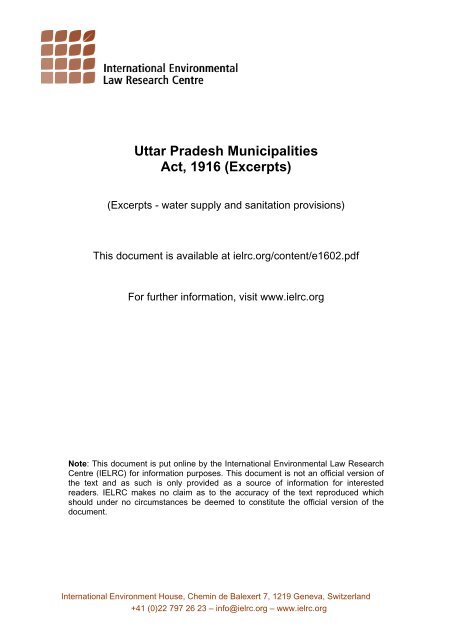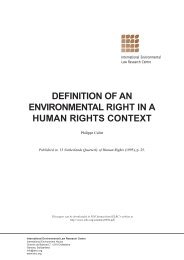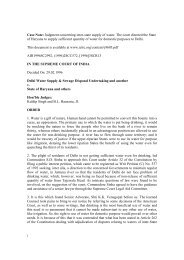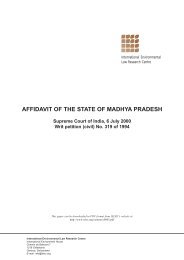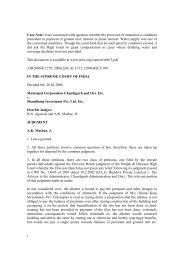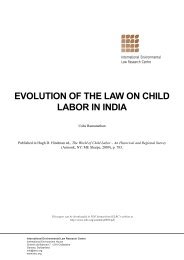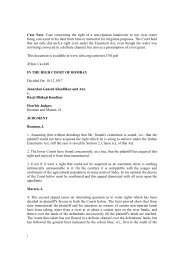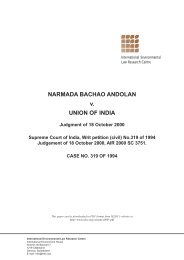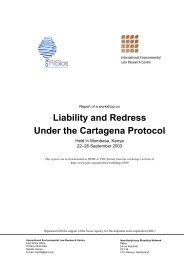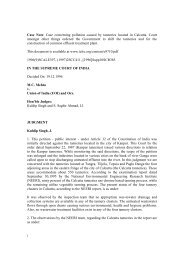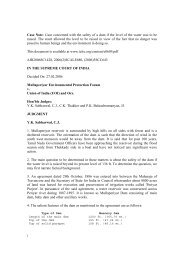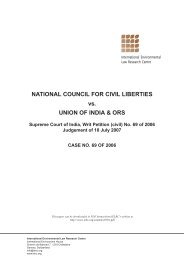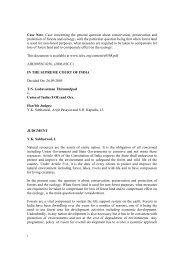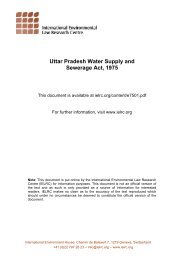Uttar Pradesh Municipalities Act, 1916 - International Environmental ...
Uttar Pradesh Municipalities Act, 1916 - International Environmental ...
Uttar Pradesh Municipalities Act, 1916 - International Environmental ...
You also want an ePaper? Increase the reach of your titles
YUMPU automatically turns print PDFs into web optimized ePapers that Google loves.
Column 1Description of assetA. Land owned under full title InfiniteColumn 2Number of years or periodB. Land held under lease. The period of the lease or the periodremaining unexpired on the assignmentof the lease.C. Assets purchased now —(a) building and Civil Engineeringworks of a permanent characternot mentioned above-(i) Offices Fifty(ii) Temporary erections such aswooden structures.(iii) Roads other than KachchaRoads.(iv) Others(b) Self-propelled vehicles(c) (i) Office furniture and fittings.(ii) Office equipmentD. Assets purchased second hand andassets not otherwise proposed for inthis Table.FiveOne hundredFiftySevenTwentyTenSuch reasonable period as the SpecialOfficer determines in each case havingregard to the nature, age and conditionof the asset at the time of its acquisitionby it-]225. Power to require private water-course, etc. to be cleaned or closed.—(1) The [Municipality] may, by notice, require the owner of, or the person havingcontrol over a private water-course, spring, tank, well or other place, the water ofwhich is used for drinking, to keep and maintain the same in good repair and to cleanthe same, from time to time, of silt, refuse or decaying vegetation and may alsorequire him to protect the same for pollution in such manner as the [Municipality]may think fit.(2) When the water of any such water-course, spring, tank, well or other place isproved to the satisfaction of the [Municipality] to be unfit for drinking, the[Municipality] may, by notice, require the owner, or person having control thereof todesist from so using such water or permitting others to so use it, and if, after suchnotice such water is used by any person for drinking, the [Municipality] may, bynotice, require the owner or person having control thereof to close such well eithertemporarily or permanently, or to enclose or fence such water-course, spring, tank,well or other place in such manner as it may direct, so that the water thereof may notbe so used.4
226. Emergent powers on outbreak of epidemic.—In the event of a [municipalarea], or any part thereof, being visited with an outbreak of cholera or other infectiousdisease notified in this behalf by the State Government, the [President] of the[Municipality] or any person authorised by him in this behalf, may, during thecontinuance of the epidemic, without notice and at any time, inspect and disinfect anywell, tank or other place from which water is, or is likely to be, taken for the purposeof drinking, and may further, take such steps as he deems fit to prevent the removalof water therefrom.227. Removal of latrines, etc. near any source of water supply.— The[Municipality] may, by notice require an owner or occupier on whose land a drain,privy, latrine, urinal, cesspool or other receptacle for filth or refuse exists within fiftyfeet of a spring, well, tank, reservoir or other source from which water is, or may be,derived for public use, to remove or close the same within one week from the serviceof such notice.228. Obligation of [Municipality] imposing water-tax.—(1) [Everymunicipality] in which a water-tax is imposed, shall be bound,—(a)(b)throughout a prescribed area or prescribed areas—(i)to maintain a system of water-supply through pipes, and(ii) to lay on water at a prescribed pressure and during| prescribedhours, and(iii) to supply in all the chief streets in which mains have been laid,water to stand-pipes or pumps situated at such intervals as areprescribed; and[subject to the rules as may be framed] to allow the owner or occupierof any building or land assessed to a prescribed minimum water-tax toconnect for the purpose of obtaining water for domestic purposes, thebuilding or land with a main by means of a communication pipe of theprescribed size and description; and(c) to supply, within every twenty-four hour, to every owner or occupierentitled to a house connection under clause (b} whose land or buildingis provided therewith such amount of water as is prescribed withreference to the water-tax payable by him and his estimatedrequirements for domestic purposes, into a storage cistern erected in oron the building or land, of a capacity not less than such amount and ofa prescribed pattern and at an altitude not exceeding the maximumprescribed for the same.(2) The word "prescribed" in sub-section (1) means prescribed by rule underSection 235.229. Supply of water by agreement.—Every Municipality] may by agreementsupply any owner or occupier of land with any water that he may require for anypurpose for such remuneration, consistent with any rate or rates prescribed by rule,and on such terms and conditions, consistent with this <strong>Act</strong> and with any rule, as areagreed on between the [Municipality] and such owner or occupier.230. Charges for water supply.—(1) When any building or land is connectedwith a main, the [Municipality] may, so far as is consistent with any agreement madeunder Section 229, charge the owner, lessor, or occupier, whichever is prescribed byrule, for all water consumed at the rate or rates so prescribed.5
(2) Provided that the [Municipality] shall deduct from the charge on account ofwater supplied in any month one-twelfth of the water-tax assessed on the building orland.231. Exemption of [Municipality] from liability owing to accident, etc.—Notwithstanding any obligation imposed on a [Municipality] by Section 228 or by anyagreement made under Section 229, a [Municipality] shall not be liable to anyforfeiture, penalty or damages for failure to supply water, if the failure to supplyarises from accident or from unusual drought or other unavoidable cause.232. Subordination to supply for domestic purposes of supply for otherpurposes.—Notwithstanding any obligation to supply water imposed by anagreement under Section 229, the [Municipality] may at any time cease to supplywater for other than domestic purposes, if it is of the opinion that such supply wouldinterfere with the supply of water for domestic purposes, in such case the[Municipality] shall not be liable to any forfeiture, penalty or damages for soceasing,—(a)unless the failure to supply such water arises from a cause other thanone specified in Section 231; and(b) unless the [Municipality] has undertaken to supply water for other thandomestic purposes by an agreement made under Section 229, makingprovision for forfeiture, penalty or damages upon failure to supply suchwater.233. Subordination of rights of supply to restrictive rules.— Notwithstandinganything contained in Section 228 or in any agreement under Section 229, the supplyof water to any building or land shall be, and shall be deemed to have been granted,subject to the provisions of any rule made under Section 235, and in particular to anyprovision as to the limit or stoppage of the supply and as to the prevention of wasteand misuse.234. Provision as to meters and connection pipes.—All meters, connectionpipes and other works incidental to the supply of water to any building or land shallexcept as otherwise provided by rule, be supplied, repaired extended and altered asmay be necessary, at the expense of the person requiring the supply, but shall be underthe control of the [Municipality].235. Water-supply rules.—(1) The following matters relating to supply of waterfrom municipal or public water works shall be regulated and governed by rules,namely,—(a)(b)any matter in respect of which this <strong>Act</strong> declares that provision shall bemade by rule;the size and nature of the mains and pipes to be laid and the waterworks to be constructed by a [Municipality] for the supply of water;(c) the construction, control and maintenance of municipal water-worksand of pipes and fittings in connection therewith;(d) the size and nature of the stand-pipes or pumps to be erected by a[Municipality];(e) the mains or pipes in which fire-plugs are to be fixed and the places atwhich keys of the fire-plugs are to be deposited;6
(f)(g)(h)(i)(j)(k)the periodical analysis by a qualified analyst of the water supply by a[Municipality];the conservation and prevention of injury or contamination to sourcesand means of water supply and appliances for the distribution of water,whether within or without [the municipal area];the manner in which connections with water works may be constructedor maintained and the agency which shall or may be employed for suchconstruction or maintenance.the regulation of all matters and things connected with the supply anduse of water and the turning on and turning off and preventing waste ofwater;the collection of water-tax and of charges relating to the supply ofwater and the prevention of evasion of the same; andany other matter relating to the supply of water in respect of which this<strong>Act</strong> makes no provision or insufficient provision and further provisionis, in the opinion of the State Government, necessary.(2) Provided that no rule shall be made under sub-section (1) affecting acantonment or part of a cantonment without the previous sanction of the CentralGovernment.[235-A. Rules relating to the supply of water by a person or company.— Thefollowing matters relating to the grant of a licence under clause (c) of Section 224 ofthe <strong>Act</strong> shall be regulated and governed by rules to be made by the State Governmentsubject to the conditions prescribed in Section 300, —(1) the selection of a licensee;(2) the form of applications for a licence;(3) the form of licence;(4) the preparation and submission of returns and accounts by the licenseein a prescribed form;(5) duties of a licensee;(6) the securing of a regular and wholesome supply of water by thelicensee to consumers;(7) the appointment of an officer of a specified rank and class to ensurethat the provisions of the <strong>Act</strong> and the rules relating to water-works arebeing properly carried out; and(8) any other matter which is necessary for the proper working of thelicence.]Power for removal of structures interfering with public works236. Unauthorised construction of street over drain or water-work.—(1)Where, on or after the 10th day of March, 1900, any street has been made or anybuilding, wall or other structure has been erected or any tree has been planted withoutthe permission in writing of the [Municipality] over a public drain or culvert or awater-work vested in the [Municipality], the [Municipality] may,—(a) by notice require the person who has made the street, erected thestructure or planted the tree, or the owner or occupier of the land onwhich the street has been made, structure erected or tree planted, remove7
or deal in any other way the [Municipality] thinks fit with the street,structure or tree; or(b) itself remove or deal in any other way it, thinks fit with the street,structure or tree.(2) Any expense incurred by a [Municipality] by action taken under clause (b) ofsub-section (1) shall be recoverable in the manner prescribed by Chapter VI from theperson by whom the street was made, structure erected or tree planted.8
Sanitation and prevention of disease267. Private drains, cesspools, dust bins, latrines, etc.—(1) A Municipality]may require by notice the owner or occupier of any land or building,—(a) to close, remove, alter repair, cleanse, disinfect or put in good orderany latrine, urinal, water-closet, drain, cesspool, dust-bin or otherreceptacle for filth, sullage-water, rubbish or refuse pertaining to suchland or building, or to remove or alter any door or trap-door of anysuch latrine, urinal or water-closet which opens on to a street or drain;or(b) to provide such latrines, urinals, water-closets, drains, cesspools, dustbinsor other receptacles for filth, sullage-water, rubbish or refuse asshould in its opinion be provided for the building or land whether inaddition or not to any existing ones; or(c) to cause any latrine, urinal or water-closet provided for the building orland to be shut-off by a sufficient roof and wall or fence from the viewof persons passing by or dwelling in the neighbourhood.(2) When requiring under sub-section (1) anything to be provided, altered ordone, the [Municipality] may specify in the notice the description of the thing to beprovided, the pattern so as to conform with which the thing is to be altered, and themanner in which the thing is to be done.268. Latrines for factories, schools and places of public resort.— The[Municipality] may require by notice any person employing more than twentyworkmen or labourers or owning, managing or having control of a market, school ortheatre or other place of public resort to provide such latrines and urinals as it maydeem fit, and to cause the same to be kept in proper order and to be daily cleansed :Provided that nothing in this section shall apply to a factory regulated by theIndian Factories <strong>Act</strong>, 1911.269. Power to require removal of nuisance arising from tanks, etc.—(1) The[Municipality] may, by notice, require the owner or occupier of any land or buildingcleanse, repair, cover, fill up or drain off a private well, tank, reservoir, pool,depression or excavation therein which may appear to the [Municipality] to beinjurious to health or offensive to the neighbourhood.(2) Provided that the owner or occupier may require the [Municipality] to acquireat its expense, or otherwise, provide, any land or right in land necessary for thepurpose of effecting drainage ordered under sub-section (1).270. Inspection of drains, privies, etc.—(1) Subject to the provisions of Section278, the [Municipality] may inspect a drain, water-closet, latrine, urinal, cesspool orother receptacle for filth, and for that purpose may cause the ground to be openedwhere it thinks fit.(2) The expense of such inspection and of causing the ground to be closed andmade good as before shall be borne by the [Municipality], unless the drain, privy,water-closet, latrine, urinal, cesspool or other receptacle for filth is found to be in badorder or condition, or was constructed in contravention of the any provisions of, ormade under, this or any other enactment, in which case such expenses shall be paid bythe owner or occupier and shall be recoverable in the manner, provided by ChapterVI.9
(b) give notice of the death to the [Municipality], whereupon the[Municipality] shall cause the carcass to be disposed of.(2) Every person bound to act in accordance with sub-section (1) shall, if he failsso to act, be liable upon conviction to a fine which may extend to ten rupees.(3) For the disposal of the dead body of an animal under clause (b) of sub-section(1), the [Municipality] may charge such fee as the [Municipality] has prescribed, andmay recover the same, if not paid in advance, from the owner or keeper of the animalin the manner provided by Chapter VI.276. Penalty for discharging sewage on public street, etc.— Whenever thewater of a sink, sewer or cesspool or any other offensive matter is allowed to flow,drain or be put upon a public street or place, or into a sewer to drain not set apart forthe purpose without the permission in writing of the [Municipality] or incontravention of any condition prescribed in such permission, the owner or occupierof the land or building from which such water or offensive matter so flows, drains oris put shall be liable, upon conviction, to a fine which may extend to [two hundredand fifty] rupees.277. Power to enter and disinfect buildings.—Subject to the provisions ofSection 287, the [Municipality] may enter and inspect a building, and may be noticedirect all or any part thereof to be internally or externally lime washed, disinfect orotherwise cleansed for sanitary reasons :Provided that nothing in this section shall apply to a factory regulated by theIndian Factories <strong>Act</strong>, 1911.278. Building unfit for human habitation.—(1) Should a building, or a room inan building, be, in the opinion of the [Municipality], unfit for human habitation inconsequence of the want of proper means of drainage or ventilation or otherwise, the[Municipality] may, by notice, prohibit the owner or occupier thereof from using thebuilding or room for human habitation or suffering it to be so used either absolutely orunless within a time to be specified in the notice, he effects such alteration therein asis prescribed in the notice.(2) Upon failure of a person to whom notice is issued under sub-section (1) tocomply therewith, it shall be lawful for the [Municipality] to require by further noticethe demolition of the building or room.279. Penalty for failure to give information of cholera, small-pox, etc.—Whoever,—(a) being a medical practitioner and in the course of such practice becomingcognizant of the existence of cholera, plague, small-pox or otherinfectious disease that may be notified in this behalf by the [StateGovernment] in any dwelling other than a public hospital in the[municipal area], or(b) in default of such medical practitioner, being the owner or occupier ofsuch dwelling, and being cognizant of the existence of any suchinfectious disease therein, or(c) in default of such owner or occupier being the person-in-charge of, or inattendance on, a person suffering from any such infectious disease insuch dwelling, and being cognizant of the existence of the diseasetherein,11
fails to give [within twenty-four hours of becoming so-cognizant] or gives falseinformation to such officer as the [Municipality] may appoint in this behalfrespecting the existence of such disease, shall be liable upon conviction to a finewhich may extend to fifty rupees :Provided that a person not required to give information in the first instance, butonly in default of some other person, shall not be punishable if it is shown that he hadreasonable cause to suppose that the information had been, or would be, duly given.[279-A. Power to examine persons suspected to be suffering from infectiousdiseases.—When there is any reason to believe that a case of infectious diseasenotifiable under Section 279 has occurred in a building the Medical Officer of Healthor other competent person deputed by him shall, subject to the provisions of Section287, enter the said building and make an examination of the person or personssuspected to be suffering from the disease and may also obtain material forpathological examination, if necessary :Provided that all females above the age of eight years shall be inspected bypersons of their own sex only]280. Removal to hospital of patients.—When a person suffering or certified by aduly qualified medical practitioner to be suffering from cholera, plague, small-pox orany other infectious disease that may be notified in this behalf by the [StateGovernment] is,—(a) without proper lodging or accommodation, or(b) living in a sarai or other public hostel, or(c) living in a room or house which he neither owns nor is otherwiseentitled to occupy, or(d) lodged in a room or set of apartments occupied by more than one familyand any of the occupiers objects to his continuing to lodge therein,the [Municipality] may, on the advice of a medical officer of a rank not inferior tothat of an assistant surgeon, remove the patient to a hospital or place at which personsuffering from such disease are received for medical treatment, and may do anythingnecessary for such removal.281. Penalty for acts done by persons suffering from certain disorders.—Whoever, while suffering from an infectious, contagious, or loathsome disorder,—(a) makes or offers for sale an article of food or drink, for humanconsumption or a medicine or drug, or(b) wilfully touches any such article, medicine or drug when exposed forsale by others, or(c) takes any part in the business of washing or carrying soiled clothes,shall be liable upon conviction to a fine which may extend to [fifty] rupees.282. Prohibition of cultivation, use of manure or irrigation injurious tohealth.—(1) If [the Director of Medical and Health Services] or the Civil Surgeon orHealth Officer certifies that the cultivation of any description of crops or the use ofany kind of manure or the irrigation of land in any specified manner,—(a) in a place within the limits of a [municipal area] is injurious orfacilitates practices are injurious to the health of persons dwelling inthe neighbourhood, or12
(b) in a place within or beyond the limits of [municipal area] is likely tocontaminate the water supply of such [municipal area] or otherwiserender it unfit for drinking purposes,the [Municipality] may by public notice prohibit the cultivation of such crop, the useof such manure or the use of the method or irrigation so reported to be injurious, orimpose such conditions with respect thereto as may prevent injury or contamination.(2) Provided that when, on any land in respect of which such notice is issued, theact prohibited has been practised in the ordinary course of husbandry for the fivesuccessive years next preceding the date of prohibition, compensation shall be paidfrom the municipal fund to all persons interested therein for damage caused to themby such prohibition.283. Power to require owners to clear away noxious vegetation.—The[Municipality] may, by notice require the owner or occupier of any land to clear awayand remove any vegetation or undergrowth which may be injurious to health oroffensive to the neighbourhood.284. Power to require excavations to be filled up or drained.— (1) In a[municipal area] for which bye-laws have been made under sub-head (g) of Heading Iof Section 298, the [Municipality] may, by notice require the owner or occupier ofany land upon which an excavation, cesspool, tank or pit has been made incontravention of such bye-laws, or in breach of the conditions under whichpermission to dig any such excavation, cesspool, tank or pit has been granted to fillup or drain the excavation, cesspool, tank or pit within a period to be specified in suchnotice.(2) The [State Government] may by notification extend the provision of thissection and bye-laws made for the purposes of this section to an area beyond the[municipal area] lying within a distance of a mile from the [boundary of themunicipal area].285. Power in respect of burial and burning ground.—(1) The [Municipality]may, by public notice, order a burial or burning ground which is certified by the CivilSurgeon or the Health Officer to be dangerous, or likely to be dangerous, to thehealth of person living in the neighbourhood, to be closed from a date to be specifiedin the notice, and shall, in such case, if no suitable place for burial place exist withina reasonable distance, provide a fitting place for the purpose.(2) Private burial places in such burial grounds may be excepted from the notice,subject to such conditions as the [Municipality] may impose in this behalf :Provided that the limits of such burial places are sufficiently defined and that theyshall only be used for the burial or members of the family of the owners thereof.(3) No burial or burning ground, whether public or private, shall be made offormed without the permission in writing of the [Municipality].(4) No person shall, except with the permission of the [Municipality] in writing,bury or burn, or cause to be buried or burnt, a corpse in a place other than arecognised burial or burning ground.(5) Should a person bury or burn, or cause or permit to be buried or burnt, acorpse, contrary to the provisions of this section, he shall be liable upon conviction toa fine which may extend to [five hundred] rupees.286. Bathing and washing places.—The [Municipality] may set apart suitableplaces for the purpose of bathing, and may specify the times at which, and the sex of13
the persons by whom such places may be used and may also set apart suitable placesfor washing animals or clothes or other things; and may by public notice prohibitbathing or the washing of animals or clothes or other things in a public place not soset apart, or at times or by persons other than those specified, and may in like mannerprohibit an [* * *] act by which water in public places or rivers may be rendered foulor unfit for use or which causes or is likely to cause in convenience or annoyance topersons lawfully using such places.14


